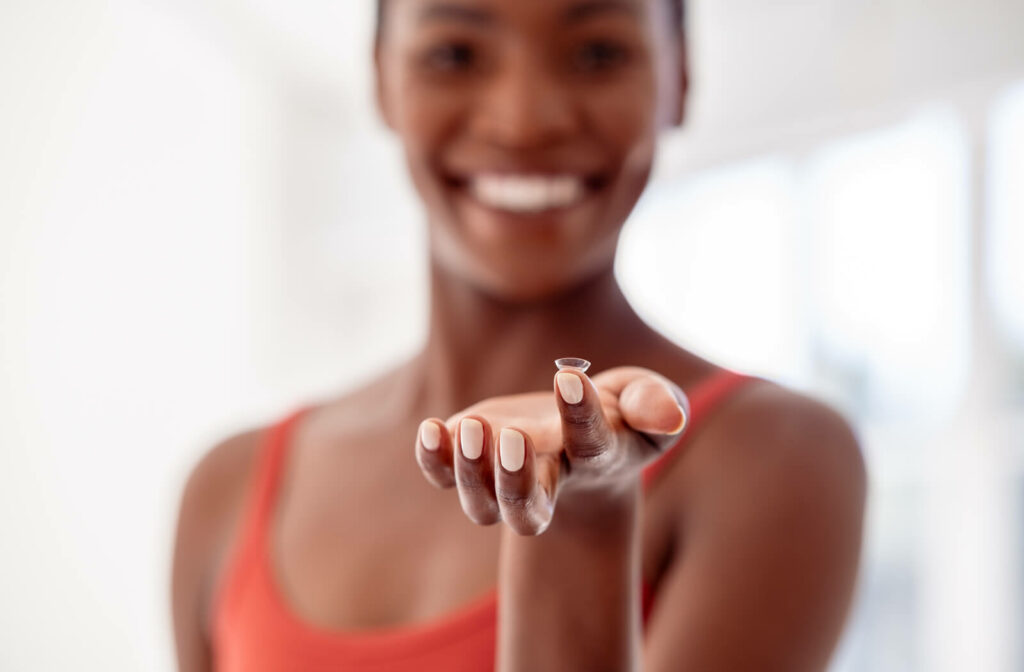Playing your favorite sport, whether that’s football or basketball while wearing glasses can be challenging. Athletes usually prefer the flexibility that contact lenses allow, and your optometrist can help you find the right contact lenses for your unique visual needs. Regardless, there are trends for best of class comfort and vision that our more active patients tend to gravitate towards. Check out our most recent Top 10 Contact Lenses list:
Othewise, let’s dive into how our Board-Certified eye doctors decide at the exam process, the different types of contact lenses, and which contacts are best for you for sports.
Understanding Your Prescription
Before we explore the best contact lenses for sports, it can be helpful to understand the different types of contact lenses available to you. Understanding your prescription through a contact lens exam is a good start.
A contact lens exam involves additional measurements to help determine the shape and size of your eye’s surface. These additional measurements differentiate a contact lens exam from a regular eye exam.
During your contact lens exam, your optometrist will perform various measurements and tests such as:
- Advanced measurements of the front surface of your eye using a corneal topographer.
- A tear film evaluation used to determine if you can produce enough tears to keep your contact lenses moist and lubricated.
- A contact lens fit evaluation using a slit lamp to evaluate the overall health of your cornea.
Suppose your eyes are not compatible with regular contact lenses. In that case, a contact lens exam can help your optometrist determine if you require specialty contact lenses.
Types of Contact Lenses
Contact lenses fall under 2 main categories, soft contact lenses, and rigid gas permeable (RGP).
Soft contact lenses are made of soft, flexible plastics that allow oxygen to pass through to the cornea. Newer materials include silicone-hydrogels to provide even more oxygen for your eyes.
RGP lenses are more durable than soft contact lenses and usually last longer. RGP lenses require a longer adjustment period, and it can take up to a few weeks for your eyes to fully adjust.
These 2 categories include other specialty contact lenses that are used to correct various vision problems, such as:
- Scleral contact lenses—these lenses are often used to treat dry eye, keratoconus, or irregular corneas.
- Orthokeratology—is an overnight treatment that temporarily reshapes the cornea during sleep. These lenses use specialty gas-permeable technology to correct refractive errors like myopia, hyperopia, and astigmatism.
- Bifocal & multifocal lenses—these lenses offer more than 1 type of prescription in a single lens. Bifocal lenses are used when 2 powers of correction are required, and multifocal lenses are used when 3 or more prescriptions are needed.
- Hybrid contact lenses—combine 2 different contact lens types. The inner portion is rigid or gas-permeable, and the outer layer is made of a softer lens, which can improve comfort and stability.
These are some of the specialty contact lenses available to you. Contact your optometrist for more information and find the right lenses for your needs.
Contact Lenses for Sports
Along with correcting various refractive errors, contact lenses provide a wider field of view than glasses and are ideal for sports. Soft contact lenses are an excellent option when searching for new lenses compatible with playing sports.
Some advantages of soft contact lenses include:
- Better peripheral vision to monitor your surroundings while playing your sport of choice.
- Soft contact lenses are easy to adapt to.
- Many soft contact lenses protect against ultraviolet (UV) rays that can harm your eyes.
Soft contact lenses are comfortable to wear and easy to adjust to, making them an ideal choice for sports wear. Newer soft lens materials include silicone-hydrogels that can provide more oxygen to your eyes.
Orthokeratology is another option for vision correction that fits well with sports. Ortho-K lenses are RGP lenses worn overnight while you sleep to correct refractive errors. These lenses reshape the cornea during sleep, and the effects are meant to last throughout the day, resulting in clear vision without wearing contact lenses throughout the day.
Your optometrist can help you find the ideal contact lenses for your unique visual needs, including any specialized options that can clear up your vision.
Focusing on Your Game
Contact lenses can help clear up your vision and allow you to focus on your game. Soft lenses are an excellent option to consider if you play sports frequently. Contact lens technology has come a long way, and there are more specialty options than ever.
Book an appointment with your optometrist today to find the right contact lenses to maximize your sports performance.



